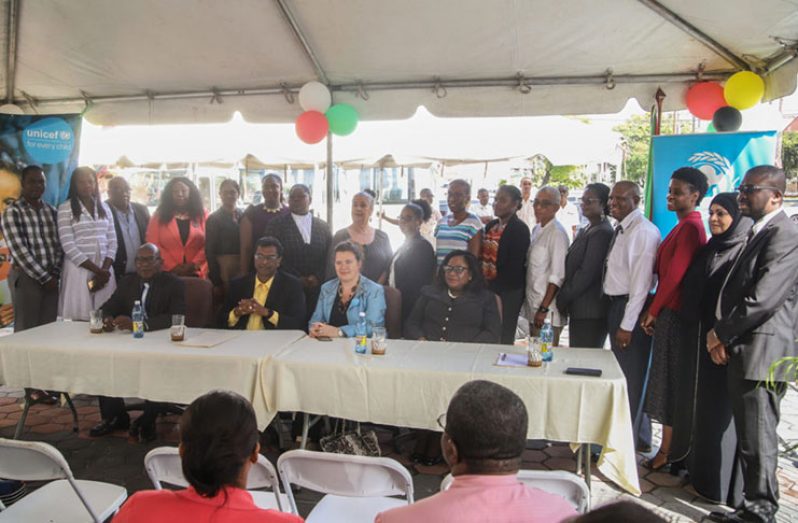MORE than 12 non-governmental organisations (NGO), along with Public Security Minister, Khemraj Ramjattan signed a Memorandum of Understanding (MoU) aimed at rehabilitating, re-educating and re-integrating errant youths into society.
The MoU was signed recently at the Ministry of Public Security’s boardroom.
Minister Ramjattan said the issue of compassionate juvenile justice was a passion of his since 2014 when former Minister, Dr. Frank Anthony, drafted the Juvenile Justice Bill.
This bill was passed by the Coalition Government in 2018. The original Act’s provisions dated back to 1930s.
The MoU is part of the Coalition Government’s effort to reduce the prison populace while giving young offenders a chance to become meaning members of society.
Ramjattan said professional support for development of youths instead of prisons warders is a huge development in all aspects of rehabilitation.
“Alternative to imprisonment, detention, whether it’s NOC or Jail. Jails are not the place for our children and a substantial majority of our young people who have committed offences must not be there, but the very serious ones, they will have to go there,” the minister explained.
He said government wanted a humane alternative to incarceration for young law- breakers, as such, emphasis was placed on diversionary measures in the act.
Minister Ramjattan believes this will also help to remove the stigma that has followed many children.
“We also see diversion in community service, an apology, a compensation to the victim in an amount that the juvenile family can afford and even before the commencement of prosecution by DPP or police officer, warnings and referrals can also be done; we see these sanctions as creative methods for our young people who would have broken the law,” Ramjattan said.
He noted that it is important that the director of Juvenile Justice be utilised with stakeholders in finding more alternatives to save youths from the stigma of incarceration. “We are generally a conservative society,” the minister said.
With support of UNICEF, Minister Ramjattan said a model MoU is being developed with other players and partners which will be used with State and Non-State agencies.
The public security minister thanked UNICEF for plans to introduce early childcare services to incarcerated females, and males where necessary. He also revealed that plans are in train to establish a “remote court participation pilot project” at New Amsterdam, Lusignan and the New Opportunity Corps.
This will see the establishment of a safe place for the delivery of justice, saving money and time and lessening the need for transportation, to and from magisterial districts in 2020.
Crafted with support from the United Nations Children’s Fund (UNICEF), the MoU calls for partnerships between the State and Non-State actors on measures, including pre-trial options, for these youths.
Also present was Chief Magistrate, Ann McLennan, who commended magistrates, in collaboration with UNICEF and NGOs, for treating youths who break the law differently from adults.
“Today, therefore, the judiciary and the magistracy are pleased that we have reached this stage where we are going to concretise these programmes,” she said.
UNICEF Resident Representative, Sylvie Fouet added that the move is aimed at giving children a second chance.
“Support and leadership from you, the ministry and the partners is really key to changing the narrative of the reality for young people in particular when they are doing minor offences.”
Regional Health Officer for Region Four, Dr. Quincy Jones, referenced to his impoverished upbringing and noted that “imprisonment to a child often does more harm than good”. He viewed the initiative as a tangible effort in the right direction.
The initiative was also welcomed by United Bridge Builder’s Chief Executive Officer (CEO), Bonita Montague.
“We can’t prepare the future for youths but we can prepare youths for the future… we have to educate the public so they understand that this does not alleviate or avert justice but it is justice.”



.jpg)








